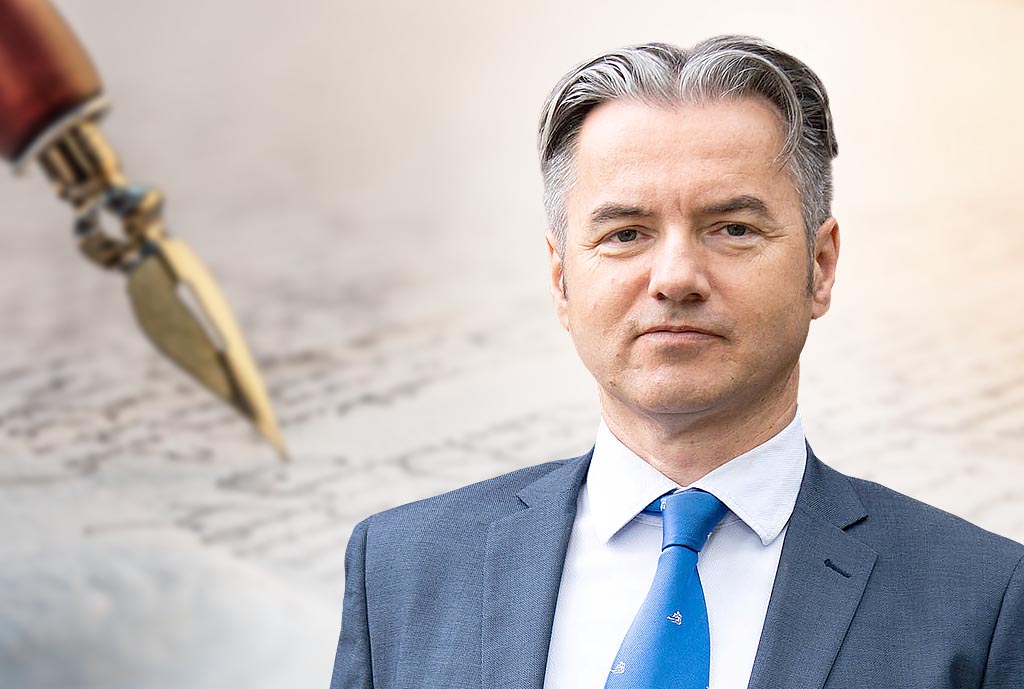By: Dr Metod Berlec
Just over a year ago, few people would have thought that the Russian Federation under the leadership of President Vladimir Putin would so recklessly attack the independent European country of Ukraine. The brutal attempt to capture the Ukrainian capital of three million people, Kyiv, which began in the early morning hours of February 24th, 2022, provoked almost unanimous condemnation from the international community. The world was shocked, stunned, and people could not believe that something so terrible could be happening on European soil in the 21st century.
The Ukrainian army and its political elite under the leadership of Volodymyr Zelenskiyy resisted Russian aggression heroically and decisively. A Russian military machine failed in the suburbs of the Ukrainian capital. This was followed by the withdrawal of the Russian army from the area. The Russians were more successful in the south and east of Ukraine. In addition to Crimea, which they illegally annexed already in 2014, they captured a large part of the Ukrainian regions of Kherson, Zaporozhye, Kharkiv, Donetsk, Lugansk. The regions of Donetsk and Lugansk have been partially in Russian hands since 2014. When the Ukrainian army launched a counter-offensive at the end of last summer and initially liberated almost the entire area around the city of Kharkiv, Russia quickly held quasi-referendums in these areas and then annexed the four regions (Kherson, Zaporozhye, Donetsk and Lugansk) at the beginning of October. In November, the Russian army was forced to withdraw from the city of Kherson and its surroundings to the left bank of the Dnieper River. By illegally annexing the four regions, Putin wanted to create the impression that Russia was defending rather than attacking, saying that the Ukrainians were attacking “Russian territory”, while the Russians were only defending themselves against attacks by the US, the European Union, and the NATO-sponsored “Nazi” of the Ukrainian army, which is said to want to destroy Mother Russia.
In recent months, the frontline has largely stabilised. To a large extent, it has become a war of position like the First World War on the Western Front. Nevertheless, the most severe fighting is taking place in the Donbas area (Donetsk and Luhansk) and around the city of Bahmut (modern Verdun), for which incredibly fierce, bloody clashes are taking place, claiming hundreds of dead and wounded soldiers on both sides every day. At this time, the Russian army occupies about 17 to 18 percent of the Ukrainian territory. Therefore, calls for an immediate end to the war are undoubtedly in favour of the Kremlin. This group also includes the public letter “Stop the war in Ukraine!”, which was recently written by left-wing intellectuals under the leadership of the last head of the Slovenian party, Milan Kučan. In it, among other things, they wrote: “Ukraine is a victim of a proxy war between the two leading nuclear powers, Russia, and the United States, for areas of influence. /…/Heavy offensive tanks on the Ukrainian-Russian front further open the danger of a direct confrontation between Russia and the West on our, European soil.” In short, the signatories of the letter oppose the West helping Ukraine with the most modern weapons so that it can successfully defend itself and – in the long term – free the territories occupied by Russia. In doing so, they forget that the international community must not allow Russia to be rewarded with Ukrainian territory for its military aggression. Violent border changes are illegal under international law. And it is also in the interest of Slovenia, as a small country, that the force of the stronger does not prevail in international politics. Violent shifting of borders does not prevail. Therefore, it is possible to agree with those who warn that the Russian army in the “granary of Europe” together with the mercenaries of the PMC Group Wagner mercenary army is committing crimes against humanity. It uses terrorist methods…
However, it is necessary to truthfully add that the war in Ukraine is also a struggle for supremacy in the world. In recent decades, after the transition from a bipolar world in which the United States of America and the Soviet Union played the main role, we are facing a slide into a multipolar world. The US, EU and their global partners are facing the growing influence of China, India and also Russia. Especially China and Russia threaten the system of Western liberal democracies (Western liberal consensus) with their totalitarian mentality. It is not in China’s interest that Russia be defeated in Ukraine. Michael McFaul, the former US ambassador to Russia, is right in this, saying that Ukraine’s victory is essential for strengthening European security. It would also dissuade Chinese leader Xi Jinping from launching a military invasion of Taiwan. Otherwise, an invasion of this island nation is only a matter of time. A Western-backed victory for Ukraine would prevent global annexation. Failure would do just the opposite. History shows how violent the world can become when wars of conquest become normal. “The US would not benefit from a return to this anarchic, violent past.” Certainly, neither would the European Union, let alone Slovenia.

